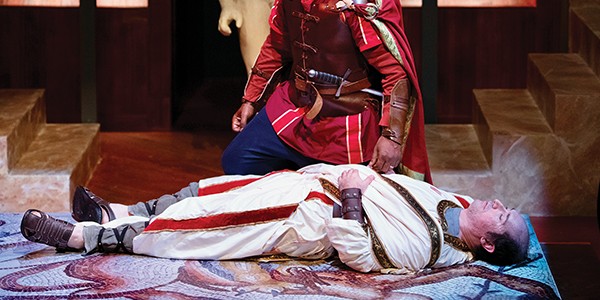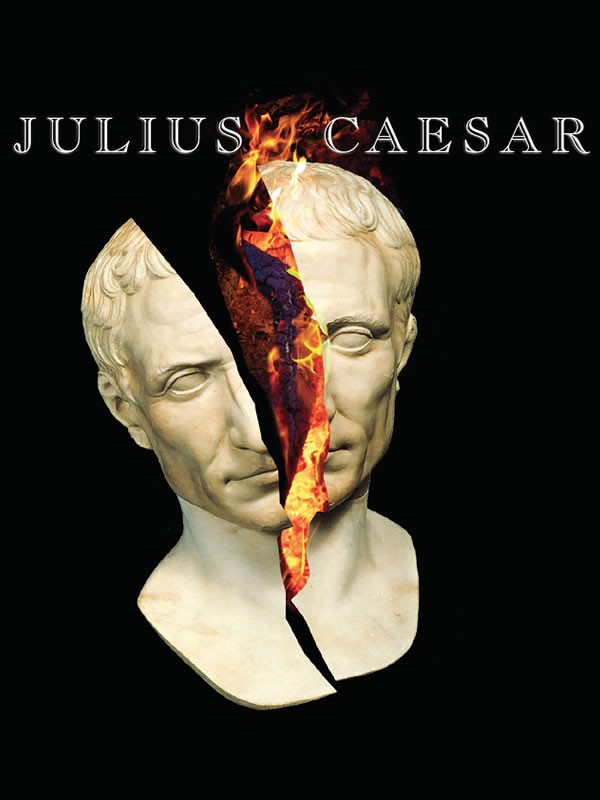It has been said that Shakespeare’s Julius Caesar is a play without villains, and that makes its tragedy all the more poignant. The point of the drama may be that violent solutions to political struggles will only backfire in the end, no matter how noble the intentions of its perpetrators. As a corollary, the play demands that we see both good and bad in all political actors, irrespective of their ideologies.
It’s a point that Tennessee Shakespeare Company’s (TSC) production of the play, which opened last Friday and continues through Sunday, October 6th, conveys well. And in the current divisive political era, it’s perhaps the message we most need to hear.
The Bard seemed to intuit the drama’s universal themes. After Caesar’s death, Cassius pauses to ask, “How many ages hence shall this our lofty scene be acted over, in states unborn and accents yet unkown?” Yet the perennial relevance of the play can obscure its deep ambivalence about seizing power by any means necessary.

TSC’s staging avoids any literalist trappings, and thus remains true to the play’s original even-handedness. True, the program does reprint, without comment, the Declaration of Independence (like the play, slightly abridged by the company), suggesting obliquely that we apply its lessons to our own country and time. But beyond that, director and company founder Dan McCleary avoids any overt linkage of the drama to our age.
That was obvious before the play even began on opening night, when McCleary welcomed the audience to TSC’s “history museum.” It’s an accurate description of the set created by scenic designer Brian Ruggaber, a multi-level faux-marble courtyard dotted with displays of Roman swords and ruined statuary. The lighting design by Jeremy Allen Fisher accentuates this by largely favoring the full illumination of a museum display. The overall effect suggests that the narrative’s events be seen at a safe remove.
While such an approach can emphasize Julius Caesar‘s universality, it can also mute the darker elements of the story. Visions of the bloody dead rising up to speak to the guilty lose their frightful, gothic edge when so brilliantly illuminated. And yet the imaginative sound design by Eric Sefton compensates for this to a degree. Even while being seated, one hears the noises of sea waves, chanting mobs, and sword play, sounds that are effectively combined with strategic lighting cues during the play itself; and the haunting music by the Westerlies suggests darker tones. But all of this seems to work at cross-purposes with the flat-white lighting palette.
Similar cross-purposes are at work in the cast as well. In many cases, this enhances the play, as when Michael Khanlarian, as Caesar, evokes arrogance and benevolence in equal measure. This is true to the work’s refusal to paint any character as a villain, yet also can undercut the dramatic need for Caesar’s power grab to be so outrageous that assassination seems the only option left to the conspirators. As it is, their motivation to kill their leader, and their inner struggle with such motivation, seems lost in the face of Caesar’s geniality.
Nonetheless, Paul Bernardo brings a gravitas and urgency to Cassius that evokes enough inner torment over the decisions he and the other conspirators make to fuel the play’s momentum. And Phil Darius Wallace may well be this production’s most valuable player, portraying both the noble Marc Antony and the doddering, comedic Casca with equal aplomb.
The actor’s challenge with all Elizabethan writing is to deliver the lines with enough nuance and dynamism to suggest real conversation, as opposed to recitation. These two fine thespians excel at this, with the rest of the cast following suit for much of the production. Yet the overall effect is to present the story somewhat abstractly: as a well-lit thought experiment, set out on a pedestal, ripe for contemplation. In the end, that may be the truest way to make this historical drama relevant to today’s climate of authoritarianism and resistance.
